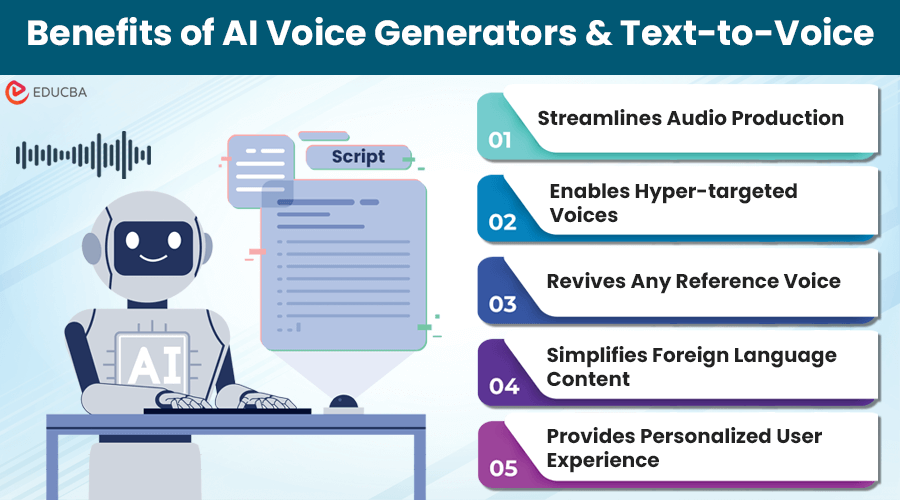
Benefits of AI Voice Generators – Introduction
Are you tired of listening to those robotic-sounding voices? Well, say goodbye to them! Thanks to advanced text-to-voice and AI voice generators, we are entering a new era of audio content creation. There are numerous benefits of AI voice generators and text-to-voice technology, but let’s first understand what they are.
Text-to-voice and AI Voice Generators are computer programs that use artificial intelligence (AI) technology to create human-like speech.
They analyze recordings of human voices to understand patterns in speech, such as intonation, rhythm, and pronunciation. Then, they generate new speech that sounds natural and human-like, often mimicking specific voices or accents. With tools like an Anime AI Voice Generator, for instance, users can generate engaging, high-quality voices that mirror specific anime characters or genres, adding a creative edge to content.
This article discusses the top ways in which text-to-voice and AI voice generators are ready to reshape the landscape of audio content creation, especially in areas like podcasting, audiobooks, media content, and more.
Cool Benefits of AI Voice Generators
Text-to-voice and AI voice generators have profoundly impacted audio content creation, revolutionizing how content is produced and consumed across various mediums. Here are some of the benefits of AI voice generators:
1. Streamlines Audio Production
Using text-to-voice and AI voice engines makes creating audio content much simpler and faster. Before, you needed complicated recording setups or had to hire voice actors. Now, you can generate it with just a few clicks. It means you can easily improve, test different voices, and try new ideas.
With this technology, creators can focus on making great content instead of dealing with technical issues. Even small teams or individuals can create high-quality audio content without much money or resources. This opens the door for more diverse voices and audio types catering to specific interests. It also means you can make personalized content on a larger scale because the barriers to doing so are lower.
2. Enables Hyper-Targeted Voices
New AI voice tools are changing the game for content creators. These tools can learn from just a handful of voice samples, allowing creators to craft unique speech styles tailored to their audience’s preferences. By experimenting with different tones and speaking styles, creators can fine-tune their AI voice models to match specific situations and engage listeners more effectively. This level of customization was previously unimaginable.
With advancing technology, it becomes even easier for creators to produce highly specific audio content that produces particular emotional responses from smaller groups of listeners.
3. Revives Any Reference Voice
What if any famous voice from the past could narrate or star in new audio content? AI voice generators make this possible by learning fine speech patterns from just a short sample of someone’s voice. This capability has tremendous creative potential. Iconic voices from films, music, politics, and more can be revived to breathe new life into archival content or participate in new media.
For instance, several technology and politics podcasts can use AI versions of former presidents and leaders to read or analyze content. More ambitious use cases leveraging recognizable voices will emerge as the quality improves.
4. Simplifies Foreign Language Content
Using advanced text-to-voice software in various languages helps creators reach wider audiences globally. This tool can turn written scripts into spoken words in different languages without needing expertise in each one. Thus, creators can produce natural-sounding narrations in any language.
Creating content in multiple languages allows creators to adapt to various cultures and markets worldwide. It also creates new opportunities for independent artists with limited resources. With the help of text-to-voice technology and AI voice generators, millions of creators can tap into a vast global audience for their audio content.
5. Provides Personalized User Experience
Text-to-voice and AI voice generation tools help creators tailor audio content to suit their audience’s preferences. They can create voices that match specific listener demographics like age, gender, accent, and tone. This customization makes the listening experience more engaging and enjoyable.
For example, an educational app might use different AI voices for tutors based on a student’s background and learning preferences.
As speech technology improves, personalized audio content becomes more powerful. Auto-generated voices can now adjust on the fly based on listeners’ engagement, leading to improved outcomes.
For instance, an audiobook might change the narrator’s voice based on a user’s reactions to different sections, making the content more captivating and personalized.
This high level of personalization will make audio content more appealing and encourage listeners to engage with it regularly.
Final Thoughts
The benefits of AI voice generators and text-to-voice apps are huge. These tools have gone from just interesting gadgets to essential resources for content creators. They provide amazing capabilities that were previously unavailable. Overall, they are fantastic at breaking down barriers to making top-notch, personalized audio content driven by speech. As these technologies gain acceptance worldwide, we can expect vibrant and inclusive audio content full of creativity and endless possibilities.
These technologies offer benefits to both professional studios and casual creators. They enable greater flexibility for trying new ideas, bringing new life to creative voices, and allowing content to reach audiences globally. As more people embrace these tools, the future looks bright for audio content, with even more creativity, inclusivity, and potential.
Recommended Articles
We believe the content shared in the “Benefits of AI Voice Generators” article has been of value to you. For additional knowledge, we encourage you to explore the articles below.

